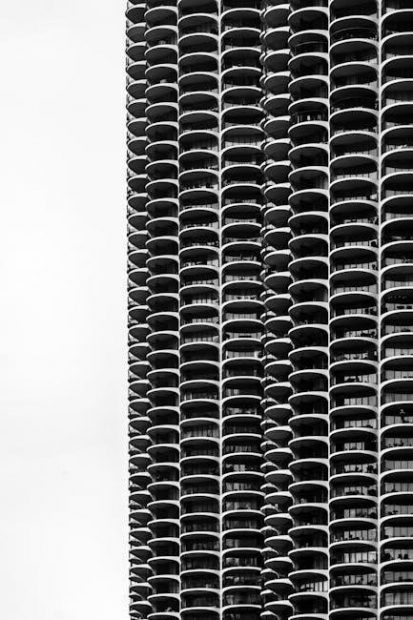The Chicago Residential Lease PDF is a legally binding document outlining rental terms, updated annually to comply with local laws, featuring a fillable format for easy use.
Overview of the Chicago Residential Lease Agreement
The Chicago Residential Lease Agreement is a detailed contract between landlords and tenants, outlining rental terms, rights, and responsibilities. It is updated annually to ensure compliance with Chicago’s Residential Landlord and Tenant Ordinance (RLTO) and other local laws. The lease is provided in a fillable PDF format for ease of use and must be used in its entirety. It covers key areas such as lease duration, rent payment terms, security deposits, tenant and landlord obligations, and required disclosures. This document ensures a legally binding and clear agreement for both parties.
Importance of Using a Chicago Residential Lease PDF
Using a Chicago Residential Lease PDF ensures compliance with local, county, and state laws, providing a legally binding agreement. The fillable format simplifies customization, while annual updates guarantee adherence to the latest legal requirements. It prevents legal disputes by clearly outlining tenant and landlord responsibilities, rent terms, and security deposits. This document is essential for maintaining clarity and fairness in rental agreements, protecting both parties’ rights and ensuring a smooth rental process.

Key Elements of a Chicago Residential Lease Agreement
A Chicago Residential Lease Agreement includes lease duration, rent terms, security deposits, tenant and landlord responsibilities, and compliance with local ordinances like the RLTO.
Lease Duration and Renewal Options
A Chicago Residential Lease Agreement typically outlines a fixed term, often 12 months, or a month-to-month arrangement. Renewal options may be automatic or require mutual agreement. The lease must specify whether it will renew or terminate at the end of the term. Tenants and landlords can negotiate terms for extensions. Chicago ordinances, like the Fair Notice Ordinance, require landlords to provide at least 30 days’ notice for lease terminations or rent increases, ensuring clarity and fairness for both parties.
Rent and Payment Terms
The Chicago Residential Lease Agreement specifies rent amount, payment methods, and due dates. Rent is typically due on the first of each month, with late fees applied after a 5-day grace period. Late fees are capped at 10% of the rent for amounts under $500, with an additional 5% on excess amounts. Tenants must receive written receipts for cash payments. Landlords cannot increase rent by more than 3.5% without providing a 60-day notice, ensuring transparency and compliance with local ordinances.
Security Deposit and Fees
The Chicago Residential Lease Agreement limits security deposits to one month’s rent. Landlords must place deposits in an Illinois bank account and provide written notice within 30 days, including the bank’s name and account number. The lease must outline conditions for returning the deposit, including deductions for damages or unpaid rent. Tenants are entitled to receive their deposit within 45 days of vacating the property. Additional fees, such as late payment charges, are capped at 10% of rent for amounts under $500, with a 5% charge on excess amounts, ensuring fair treatment for both parties.
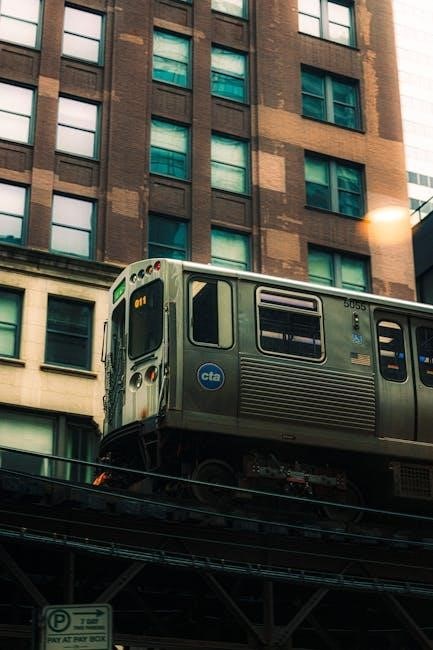
Tenant Responsibilities and Obligations
Tenants in Chicago are required to maintain the rental property in a clean and safe condition, promptly reporting needed repairs to the landlord. They must comply with all applicable laws, including the Residential Landlord and Tenant Ordinance (RLTO), and ensure the unit is not overcrowded. Tenants are responsible for paying rent on time and adhering to lease terms. They must also refrain from making unauthorized alterations to the property and ensure all utilities are paid unless provided by the landlord. Proper waste disposal and compliance with building rules are also expected, fostering a respectful and lawful tenancy arrangement.
Landlord Responsibilities and Obligations
Landlords in Chicago must maintain the rental property in a safe and habitable condition, addressing necessary repairs promptly. They are required to provide tenants with a written summary of the Residential Landlord and Tenant Ordinance (RLTO) and disclose any known issues. Landlords must also ensure compliance with housing codes and provide proper notice before entering the unit. Additionally, they are obligated to manage security deposits in accordance with Illinois law and return them within 45 days of lease termination. Fulfilling these responsibilities ensures a lawful and harmonious landlord-tenant relationship under Chicago’s regulations.
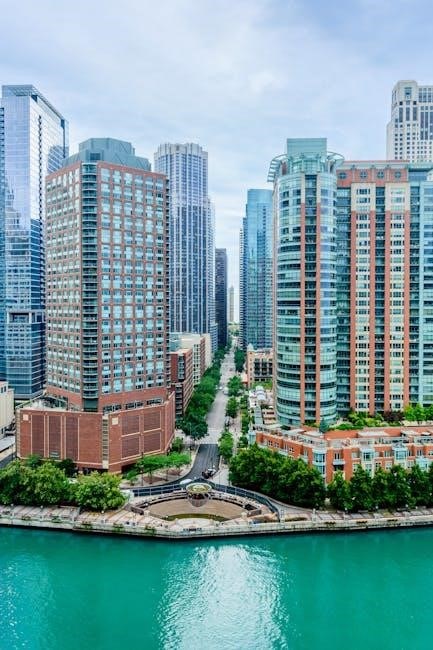
Importance of Using the Correct Chicago Residential Lease Form
Using the correct Chicago Residential Lease Form ensures compliance with local laws, providing legal accuracy and clarity on rights and obligations, essential for both landlords and tenants.
Annual Updates to the Lease Agreement
The Chicago Residential Lease Agreement is updated annually to reflect changes in local, county, and state laws. Each year, the Chicago Association of REALTORS releases a new version of the lease, ensuring it remains compliant with current legal requirements. Using an outdated lease can lead to legal issues, as older versions may not align with updated regulations. Landlords must ensure they use the most recent version for each calendar year, as leases are date-sensitive and not valid beyond their specified term. Annual updates also incorporate new disclosures or notices required by law.
Compliance with Local, County, and State Laws
Compliance with local, county, and state laws is crucial for Chicago residential leases. The lease must adhere to the Residential Landlord and Tenant Ordinance (RLTO), which outlines rights and responsibilities for both landlords and tenants. Additionally, it must include mandatory disclosures, such as bed bug prevention notices and utility shut-off notifications. Landlords are required to maintain habitable living conditions and adhere to specific regulations, such as the Chicago Heat Ordinance, ensuring proper heating during winter months. Failure to comply can result in legal consequences, emphasizing the importance of using an updated, compliant lease agreement. Proper compliance ensures a legally binding and fair rental contract for all parties involved.
Fillable PDF Format for Easy Use
The Chicago Residential Lease PDF is available in a fillable format, designed to simplify the process of creating and customizing rental agreements. This format allows landlords to easily input specific details, such as rent amounts, lease terms, and property information, while maintaining the structure and compliance of the agreement. The fillable PDF ensures accuracy and efficiency, reducing the risk of errors. It also provides a professional and organized way to present the lease to tenants, streamlining the rental process while ensuring all legal requirements are met. This user-friendly format is a key advantage for landlords managing properties in Chicago.

Legal Requirements for Chicago Residential Leases
Chicago residential leases must comply with local, state, and county laws, including mandatory disclosures, prohibited practices, and specific tenant protections under the RLTO and other ordinances.
Residential Landlord and Tenant Ordinance (RLTO)
The RLTO governs Chicago residential leases, ensuring landlord and tenant rights are protected. It covers maintenance standards, security deposits, eviction processes, and tenant protections. Landlords must provide written disclosures, maintain habitable conditions, and follow specific eviction procedures. Tenants have the right to withhold rent for repairs and seek remedies for violations. Compliance with RLTO is mandatory for all Chicago rental properties, except certain exempt units, ensuring a fair and lawful rental relationship.
Required Disclosures and Notices
Chicago landlords must provide specific disclosures and notices to tenants. These include a bed bug prevention and treatment brochure, as mandated by the Chicago Department of Health. Additionally, landlords must disclose any intent to shut off utilities, providing a date and affected areas. If the property contains lead paint, federal disclosures are required. Failure to provide these notices can result in legal penalties, ensuring transparency and tenant protection under local regulations.
Prohibited Practices by Landlords
Chicago landlords are prohibited from engaging in certain practices, such as requiring tenants to renew leases more than 90 days in advance or charging excessive late fees. They cannot demand payment for repairs that are their legal responsibility. Additionally, landlords are barred from locking out tenants or shutting off utilities to force eviction. These prohibitions are enforced under local ordinances, ensuring fair treatment and protecting tenants from unjust practices. Violations can result in legal consequences, emphasizing the importance of compliance with Chicago’s landlord-tenant laws.
Penalties for Non-Compliance
Non-compliance with Chicago’s residential lease laws can result in significant penalties for landlords. Violations of the RLTO or other local ordinances may lead to fines, court-ordered relief, or even criminal charges. For example, failing to provide required disclosures or engaging in prohibited practices can result in financial penalties. Tenants may also withhold rent or sue for damages if landlords breach legal obligations. Compliance is crucial to avoid legal repercussions and maintain a positive landlord-tenant relationship. Penalties underscore the importance of adhering to Chicago’s specific rental housing regulations.

Optional Disclosures and Addendums
Optional disclosures include bed bug prevention notices, pest control addendums, and crime-free clauses. These addendums, while not mandatory, help outline tenant responsibilities and reduce potential liability.
Bed Bug Prevention and Treatment Notice
Chicago landlords must provide tenants with a bed bug prevention and treatment notice. This document, prepared by the Department of Health, educates tenants on identifying bed bugs, preventing infestations, and proper treatment protocols. Tenants are encouraged to report any signs of bed bugs promptly to ensure effective management. While landlords are not required to cover treatment costs, providing this notice ensures compliance with city regulations. This notice is mandatory for all residential leases entered into or renewed after 2013, helping maintain a safe and habitable living environment for renters.
Pest Control Addendum
The Pest Control Addendum is a recommended addition to Chicago residential leases, outlining tenant responsibilities for pest prevention and reporting. While not mandatory, it clarifies expectations for maintaining a pest-free environment. Tenants are typically required to report signs of pests promptly and cooperate with extermination efforts. This addendum helps prevent infestations and ensures both parties understand their roles in addressing pest-related issues. It is particularly relevant in Chicago, given the city’s challenges with rodents and other pests, and can help mitigate potential liabilities for landlords and tenants alike.
Crime and Drug-Free Addendum
The Crime and Drug-Free Addendum is an optional but recommended addition to Chicago residential leases. It prohibits tenants and their guests from engaging in illegal activities, such as drug-related crimes or gang activity, on the property. This addendum outlines the tenant’s responsibility to maintain a safe and lawful living environment. By including this clause, landlords can help prevent illegal activities and protect their property from potential legal or financial repercussions. It also serves as a proactive measure to foster a secure and respectful community for all residents. Tenants are typically required to acknowledge and comply with these terms explicitly.
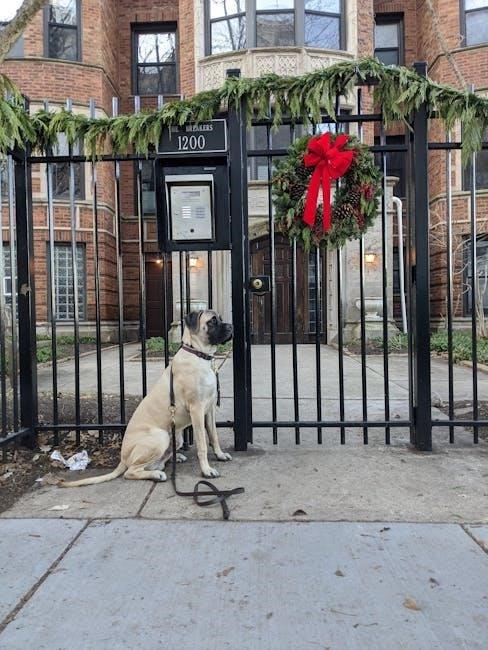
Completing the Chicago Residential Lease Form
Completing the Chicago Residential Lease Form requires careful attention to detail, ensuring all fields are filled accurately to comply with local laws and regulations. Proper execution guarantees a legally binding agreement, protecting both landlord and tenant rights effectively. The form must be filled in its entirety, with both parties signing to validate the terms. This ensures clarity and mutual understanding of the rental obligations and responsibilities outlined within the lease agreement. Accuracy is key to avoiding disputes and ensuring compliance with Chicago’s specific legal requirements. The lease form should be reviewed thoroughly before signing to confirm all details are correct and agreed upon by both parties. This step is crucial for maintaining a harmonious landlord-tenant relationship and preventing potential legal issues down the line. By following the outlined steps and ensuring all sections are completed, users can create a comprehensive and enforceable lease agreement tailored to their specific rental situation. Proper completion also ensures that the lease remains up-to-date with any annual changes in local, county, or state laws. This attention to detail helps in maintaining the integrity of the agreement and safeguards the interests of both parties involved. The lease form is designed to be user-friendly, with fillable PDF formats available for easy customization and efficient completion. It is essential to adhere to the instructions provided and seek legal advice if any uncertainties arise during the completion process. This ensures that the final document is both legally sound and mutually beneficial. By taking the time to complete the form accurately, landlords and tenants can establish a clear and fair rental agreement that meets all necessary legal standards. This not only protects their rights but also contributes to a smooth and trouble-free tenancy. Completing the form correctly is the first step toward a successful rental experience in Chicago.
Steps to Fill Out the Lease Agreement
- Download the official Chicago Residential Lease PDF form from a trusted source.
- Review the lease agreement thoroughly to understand all terms and conditions.
- Fill in all required fields, including property details, rental terms, and payment information.
- Ensure compliance with local laws by including mandatory disclosures and addendums.
- Have both the landlord and tenant sign the agreement to validate the lease.
- Retain a copy for your records and provide one to the tenant.
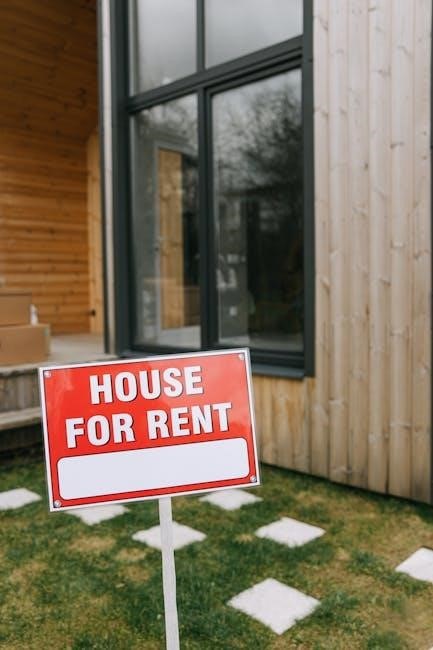
Required Signatures and Witnesses
The Chicago Residential Lease Agreement requires signatures from both the landlord and tenant to validate the contract. Witnesses are not mandatory but can provide additional verification. Ensure all parties print their names clearly alongside their signatures for transparency. This step ensures the lease is legally binding and adheres to local regulations. Proper execution of signatures is essential to uphold the agreement in court if disputes arise. Both parties should retain a signed copy for their records.
Additional Documentation Needed
When completing a Chicago Residential Lease Agreement, additional documentation may be required to ensure compliance with local laws. This includes a Bed Bug Prevention and Treatment Notice, which must be provided to tenants. Landlords may also choose to include addendums such as a Pest Control Addendum or a Crime and Drug-Free Addendum to outline tenant responsibilities further. While these are optional, they help prevent disputes and ensure clarity. Always consult an attorney to verify all legal requirements are met. Proper documentation protects both parties and ensures a smooth rental process.
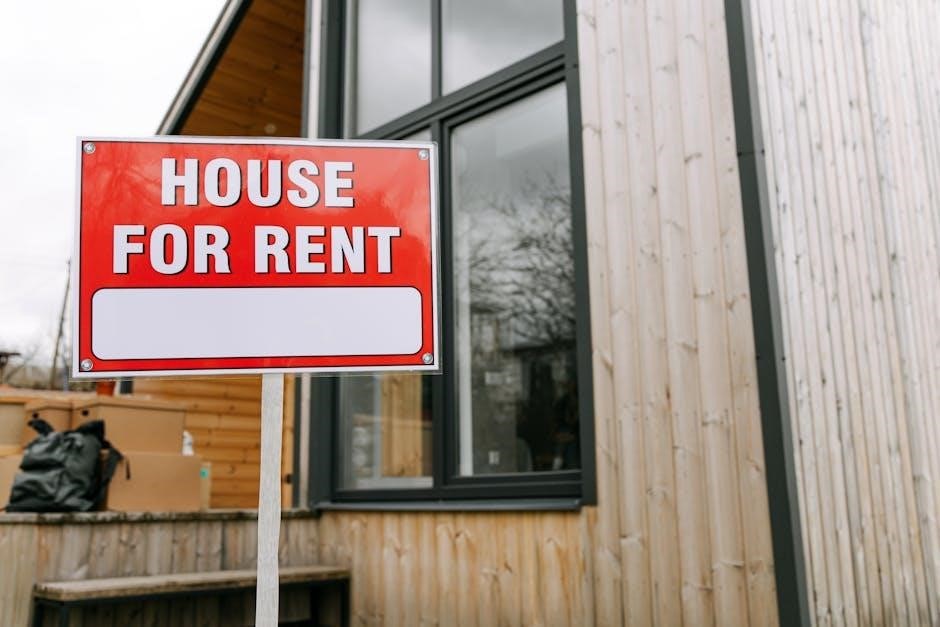
Key Ordinances Affecting Chicago Residential Leases
Chicago’s residential leases are governed by key ordinances such as the Heat Ordinance, Relocation Plan Ordinance, and Fair Notice Ordinance, ensuring compliance and tenant protections in rental agreements.
Chicago Heat Ordinance
The Chicago Heat Ordinance requires landlords to maintain a minimum indoor temperature of 68°F during daytime hours (8:30 AM to 10:30 PM) and 66°F at night. This ordinance applies from September 15 to June 1 annually. Landlords must ensure heating systems are functional and avoid using unapproved heating devices. Failure to comply can result in fines and legal action. Tenants can report violations to the City of Chicago. This regulation ensures habitable living conditions and is part of the broader Residential Landlord and Tenant Ordinance.
Chicago Relocation Plan Ordinance
The Chicago Relocation Plan Ordinance protects tenants, particularly seniors, in affordable housing buildings undergoing renovations. It requires landlords or developers to provide relocation assistance, including financial support and help finding alternative housing, to eligible tenants. This applies to buildings with at least 24 units. The ordinance ensures vulnerable populations are not displaced without adequate support. Developers must comply with these requirements for eligible housing, aligning with Chicago’s efforts to safeguard tenant rights and promote fair housing practices.
Chicago Fair Notice Ordinance
The Chicago Fair Notice Ordinance requires landlords to provide tenants with specific notice periods for lease terminations and rent increases. For terminations, landlords must give 60 days’ notice if the tenant has lived in the unit for less than five years, and 120 days’ notice for tenancies exceeding five years. Rent increases exceeding 3.25% also require a 60-day notice, while smaller increases need a 30-day notice. This ordinance ensures tenants have adequate time to adjust to changes, aligning with Chicago’s broader efforts to protect tenant rights and maintain housing stability.

Eviction and Lease Termination
Eviction and lease termination in Chicago are governed by strict legal protocols, ensuring fair processes for both landlords and tenants, with clear guidelines for non-compliance resolution.
Grounds for Eviction in Chicago
In Chicago, landlords can evict tenants for non-payment of rent, violation of lease terms, or illegal activities on the property. The Residential Landlord and Tenant Ordinance (RLTO) outlines specific eviction grounds, ensuring legal protections for tenants. Proper notice and court procedures must be followed, with landlords required to provide tenants with opportunities to cure violations before eviction. Tenants’ rights are strongly protected under Chicago law, emphasizing fair eviction processes and adherence to legal guidelines to maintain housing stability.
Lease Termination Process
In Chicago, lease termination requires adherence to specific legal procedures. Landlords must provide written notice to tenants, with the length varying based on the lease type. For year-long leases, a 60-day notice is typically required, while month-to-month agreements may need only 20 days’ notice. Tenants must also receive proper notice before rent increases or lease termination. If a tenant breaches the lease, landlords must follow eviction laws, which include filing a lawsuit and obtaining a court order. Tenants have rights to cure violations, and landlords must act in compliance with the RLTO and local ordinances.
Ensuring compliance with Chicago’s residential lease laws is crucial. The fillable PDF simplifies the process, protecting both landlords and tenants with clear, legally binding terms.
Importance of Compliance
Compliance with Chicago’s residential lease laws is essential to avoid legal disputes and penalties. The Chicago Residential Lease PDF ensures adherence to the Residential Landlord and Tenant Ordinance (RLTO), protecting both parties. Non-compliance can result in fines and legal action, undermining the landlord-tenant relationship. Properly executed leases prevent misunderstandings and ensure all obligations are met. Annual updates reflect changes in local laws, maintaining relevance and legality. Tenants and landlords benefit from clear, legally binding terms, fostering a fair and respectful rental environment. Compliance ensures smooth transactions and long-term harmony in rental agreements.
Final Tips for Landlords and Tenants
Both landlords and tenants should thoroughly review the Chicago Residential Lease PDF to ensure understanding of rights and responsibilities. Landlords must document property conditions and maintain open communication with tenants. Tenants should carefully read the lease, ask questions, and seek legal advice if needed. Regular inspections and timely repairs can prevent disputes. Clear communication fosters a positive rental relationship. Non-compliance with lease terms can lead to penalties, so adherence is crucial for both parties. Proper documentation and mutual respect are key to a harmonious tenancy.
